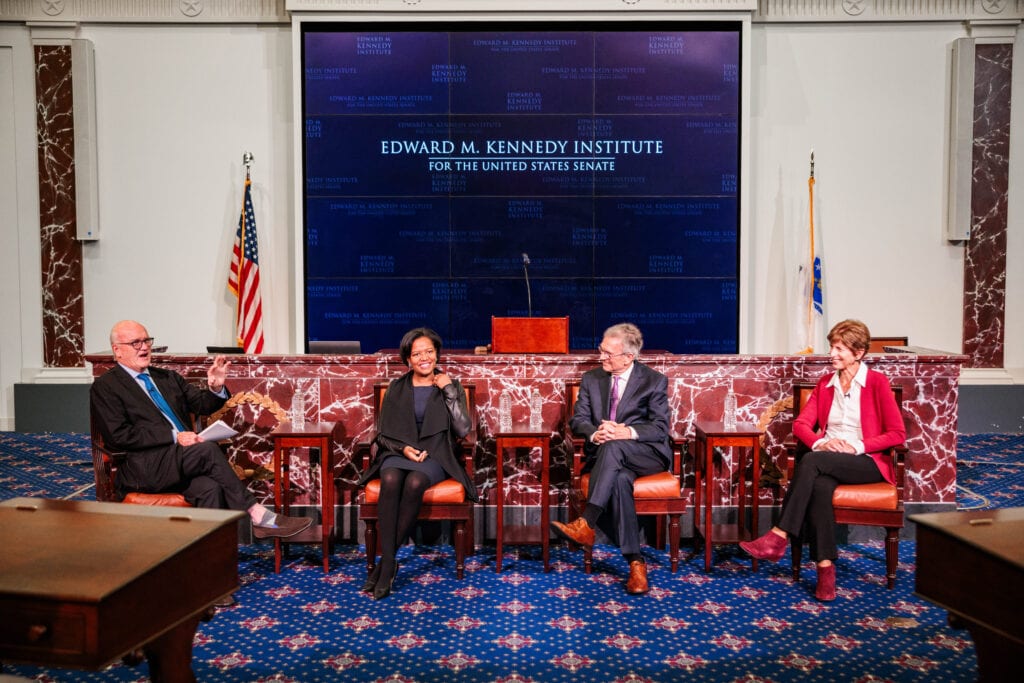PRESS RELEASE

Kennedy Institute, Pew Research Center host conversations on Americans’ deepening dissatisfaction with elected officials, government
October 5, 2023 (Boston, Mass.) – The Edward M. Kennedy Institute and the Pew Research Center hosted a former senator, former governor, and former state senator for a candid conversation on Americans’ deepening dissatisfaction with their elected officials and government and what that means for the future of American politics.
Speaking on a panel moderated by Morning Joe Senior Contributor and former Boston Globe columnist, Mike Barnicle, panelists Senator Tom Daschle, Governor Christine Todd Whitman, and State Senator Linda Dorcena Forry reflected on the new Pew Research Center report showing that Americans’ views of politics and elected officials are unrelentingly negative, and discussed how we can work to change American’s faith in politics and government.
Associate Director of Research at the Pew Research Center, Jocelyn Kiley, presented Pew’s findings in their report, “Americans’ Dismal Views of the Nation’s Politics,” which identified widespread criticism of the three branches of government, both political parties, as well as political leaders and candidates for office.
“We have been in a prolonged period of low trust in government. One of the things we take away is that we really for the last twenty years or so have been in a place where about 20% of Americans say they trust the government to do what’s right all of most of the time, said Jocelyn Kiley. “In the ‘70s, ‘80s and ‘90s, there were peaks and valleys of trust in government. These days there are more valleys than peaks.”
“People are worried that the level of dysfunction is affecting their lives in ways that are very palpable,” said Tom Daschle. “They hold the government accountable for the challenges they’re facing personally, and it becomes a very significant part of their lives. And that’s what we’ve got to figure out: how do we restore the trust?”
“Back then, it was all about what was doing what’s right for the country. You could disagree, and you’d have people who would make their political speeches, and then they’d go back and sit down and ask ‘How do we solve this problem?’ That’s what was happening,” said Christine Todd Whitman. “And the nice thing is that in a state, you have much more direct impact on your constituents. They know who you are, you know who they are, they know how to get a hold of you – it’s a much more personal relationship than when you go to Washington. And so there was more pressure on both sides of the aisle to actually deliver to make things happen because that’s what people expected of local elected officials.”
“Government is not just federal. Government is local. Government is public schools, it’s the firefighter, it’s the police officer, it’s the EMT that’s saving a life – that is government. It’s the pothole that is being fixed. So how do we make it real for people?” said Linda Dorcena Forry. “We are sitting in a namesake institution right now named after Senator Kennedy, and I think people yearn for the collegial and bipartisan relationships that he enjoyed. But he didn’t give up the hyper-competitiveness, or his commitment to his party and his principals.”
“American’s distrust in all branches of government, including the Senate, shows that there is a lot of work to be done to regain the public’s confidence and show that it is possible for our political leaders to work together to improve people’s lives,” said Adam Hinds, CEO of the Edward M. Kennedy Institute. “Tonight’s discussion not only underscored the dire state of our politics, but provided reflections on where the public is on possible paths forward. The Kennedy Institute is committed to continuing cutting-edge convenings that strengthen American democracy.”
The report presented by the Pew Research Center included data on how Americans view the Senate, House of Representatives, and Congress as a whole. The data showed that throughout much of the 1980s, ’90s and early 2000s, Congress was viewed more favorably than unfavorably. These views were more evenly split in the late 2000s and began to shift in a negative direction over the next several years.
Additional data showed:
- 72% of Americans say they have an unfavorable view of Congress. There is no partisan gap in ratings of Congress today, with 26% of both Republicans and Democrats expressing a favorable view of Congress.
- 65% of Americans say they have an unfavorable view of the U.S. Senate
- 64% of Americans say they have an unfavorable view of the House of Representatives
The event was hosted in the Kennedy Institute’s replica senate chamber and streamed live. A recording of the event is available here: https://www.youtube.com/watch?v=hdY1-8MXHdw
About the Edward M. Kennedy Institute
The Edward M. Kennedy Institute for the United States Senate is dedicated to educating the public about the important role of the Senate in our government, encouraging participatory democracy, invigorating civil discourse, and inspiring the next generation of citizens and leaders to engage in the civic life of their communities. Learn more at emkinstitute.org.
About Pew Research Center
Pew Research Center is a nonpartisan fact tank that informs the public about the issues, attitudes and trends shaping the world. It does not take policy positions. The Center is a subsidiary of The Pew Charitable Trusts, its primary funder. Subscribe to our daily and weekly email newsletters or follow us on social media.
###


